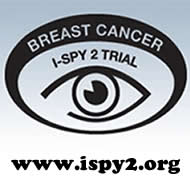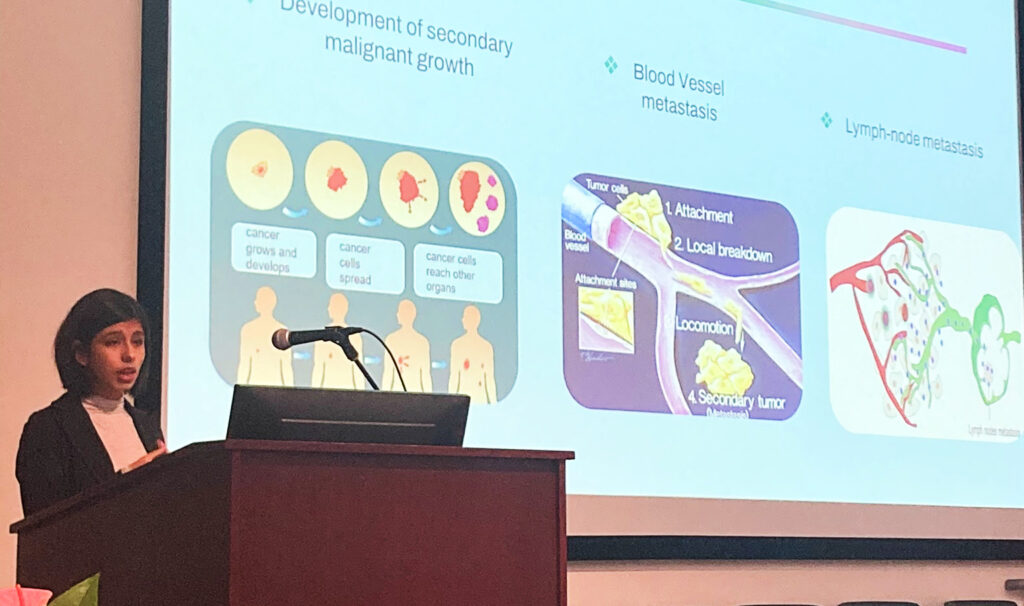June 20, 2012 — The Center for Applied Proteomics (CAPMM) at George Mason University recently released a progress report on its work with the I-SPY 2 trial. The Side-Out Foundation is hopeful that its support of the trial will affect the future of breast cancer treatments.
I-SPY 2 Protein Pathway Activation Mapping to Uncover New Therapeutic Targets and New Personalized Therapy Markers to Better Treat Stage II/III Breast Cancer in the NeoAdjuvant Setting: A Project Update
Dr. Julia Wulfkuhle, Mrs. Isela Gallagher, Dr. Lance Liotta, Dr. Emanuel Petricoin
Center for Applied Proteomics and Molecular Medicine
School of Systems Biology
George Mason University
June 1, 2012
Precis
The I-SPY 2 trial employs a groundbreaking adaptive design clinical trial model that utilizes advanced molecular profiling techniques of individual patients’ tumors in a clinical trial testing promising new treatments, identifying which treatments are most effective in different breast cancer patient subpopulations. The adaptive trial design will enable researchers to use early data from one set of patients to guide decisions about which treatments might be more useful for patients later in the trial, which should eliminate ineffective treatments more quickly. Through the ability to identify molecular markers that could predict therapeutic response and thus stratify patients for a given targeted therapy, I-SPY 2 has the potential to significantly reduce the cost of drug development and speed the process of screening drugs with the goal of bringing safe and effective new drugs to market more efficiently (http://ispy2.org/). I-SPY 2 was developed to allow the activity of drugs to be assessed much earlier in the research process, potentially enabling drugs to be developed and approved using fewer patients, less time and far fewer resources. The goal is to shave several years and hundreds of millions of dollars off the current process.
Update
Through the generous support of the Side-Out Foundation, and in partnership with the Foundation for the National Institutes of Health (FNIH), the Center for Applied Proteomics at George Mason University has been able to apply its novel cutting-edge drug target activation mapping technology to the I-SPY 2 trial patient cohort. Beginning in January 2012, the CAPMM team has been very busy! We have been receiving pretreatment tissue samples from the University of California San Francisco I-SPY 2 biobank, and have been performing the purification of tumor cells and surrounding immune and stromal cells from the tissue — a critical process in generating accurate drug target measurements. In fact, CAPMM team members are performing the first systematic analysis of drug treatment effects within the tumor microenvironment, whereby therapy can be studied in the context of treatment effects on different cell populations within the tumor biopsy. Since the beginning of the year things have rapidly accelerated! The overall funded goal was to develop drug target activation profiling maps of 100 breast cancer patients’ tumors to identify patients who could respond both to FDA cleared therapies that are on the market today as well as to experimental therapeutics that are in Phase II/III testing. Based on the hard work and determination of the CAPMM team, we finished microdissecting the tumor cells from nearly 60 tumor cases and at our current accelerating rate, we expect to be able to complete the molecular analysis of nearly twice as many samples as we estimated, including both pre and post treatment samples. These first patients have been treated with either Veliparib™ (Abbott’s PARP inhibitor) or Neratinib™ (Puma Biotechnology’s tyrosine kinase inhibitor).
It is our goal to emerge from this effort with functional drug target activities from each patient’s tumor to provide actionable information for the I-SPY 2 trial investigators. This data will be mined by top bioinformaticists and biostatisticians to identify robust biomarkers that can be rigorously tested and validated. Through the direct efforts of The Side-Out Foundation and the generous donations of the wonderful Side-Out supporters, this first-of-its-kind molecular profiling data can be the biomarker engine for near-term personalized therapy efforts.
About the I-SPY 2 Breast Cancer Clinical Trial
The I-SPY 2 TRIAL will focus on treatment in the neoadjuvant therapy setting, in which chemotherapy is given to patients to reduce tumor size before surgery. All patients will receive the current standard of care and most participants will receive one investigational drug. A distinctive feature of the trial is that it will screen multiple drugs from multiple companies—up to 12 different cancer drugs over the course of the trial. In order to do this, FNIH received a master Investigational New Drug (IND) approval from the FDA—which allows the I-SPY 2 TRIAL team to graduate, drop and add drugs seamlessly throughout the course of the trial without having to stop the trial to write a whole new protocol. This will dramatically reduce the time it takes to move from one drug to another in the trial.








